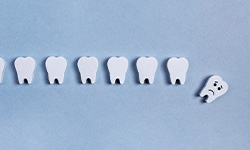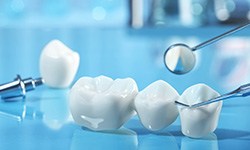
Dentures – San Antonio, TX
Replace Your Missing Teeth Without Breaking the Bank
Missing teeth can be challenging in your everyday life. Whether you are trying to enjoy your favorite snack, speak to your loved ones, or smile confidently for the camera, having gaps in your smile can cause difficulties. Fortunately, you don’t need to settle for tooth loss. Dr. Zachary Brice can replace your missing teeth without breaking the bank thanks to dentures in San Antonio. To learn more about your options or to schedule your initial consultation, give us a call!
Why Choose Brice Dental for Dentures?
- Customized for Lifelike Appearance
- Evening Appointments Available
- Flexible Financing Options
Who's a Good Candidate for Dentures?

Potentially, anyone missing some or all their teeth can benefit from these versatile restorations. However, that doesn’t mean they’re automatically the ideal solution for your unique circumstances. Before proceeding, you must consult with Dr. Brice to ensure you’re a good candidate for this treatment. If he finds signs of issues that might interfere, like gum disease or flattened bony ridges, you may need to undergo other procedures before you’re ready for dentures.
Continue reading to learn more about the traits necessary to support these prosthetics, and feel free to contact us for additional information.

Effects of Missing Teeth
According to the American College of Prosthodontics, the number one leading cause of tooth loss is periodontal disease. If plaque forms along your gumline, bacteria can penetrate the connective tissues and infect them. Eventually, they pull away from your enamel to escape the disease, leaving your teeth without a firm enough foundation to remain put. It’s also possible for severe tooth decay or physical trauma to result in missing teeth.
Unfortunately, when they fall out, it impacts your oral health in several ways. Your remaining teeth could drift out of alignment to fill in the gaps, which wears them down prematurely and leaves them vulnerable to damage. Plus, without a root to stimulate new bone growth every time you bite down, your jawbone starts to thin and eventually becomes too frail to support your remaining teeth.

What Qualifies You for Dentures?
Dentures can help rebuild your smile’s appearance and functionality whether you’re missing a few or all your teeth. However, you must have a sufficiently healthy mouth to be able to maintain them. This solution is ideal for people who have:
- Healthy gums. They press tightly against your gums all day, so you need sufficiently healthy tissue to keep them in place.
- A consistent dental hygiene routine. You must be willing and able to remove your dentures twice daily to thoroughly brush and floss them to prevent gum disease and other issues.
- Sufficient jawbone density. If your jaw has already begun to deteriorate, your bony ridges might be too flat to anchor your prosthetics.
If our team finds anything that prevents you from getting dentures right away, like a thinning jawbone, don’t lose hope! It’s possible that additional procedures, like a bone graft, can boost your oral health to support a restoration.

Alternative Tooth-Replacement Options
Although they’re an incredibly popular way to replace missing teeth, dentures aren’t the best solution for every situation. If you’re not a good fit for this method, we might suggest an alternative treatment like:
- Dental bridges. These are perfect for patients who have lost one or several teeth consecutively. They contain the correct number of teeth with a dental crown on either end that anchors to healthy abutment teeth or implants on either side of the gap in your grin.
- Dental implants. This method involves surgically placing a titanium rod where your tooth used to be, which eventually fuses with your jawbone. This is then capped with an appropriate restoration, like a dental crown, to rebuild your smile.
Types of Dentures

There are a few different types of dentures out there to cater to your individual needs. During your initial consultation, we’ll determine which of the following is right for you:
Partial Dentures
For people who have suffered from tooth loss but still have some healthy teeth a partial denture may be the solution for you. This type of denture has an acrylic or metal base and is designed to fit like a puzzle piece between your existing teeth to fill in gaps. Small, discreet clasps wrap around your natural tooth structure to hold your new replacement teeth in place.
Full Dentures
Full dentures are designed to restore an entire arch of teeth. They are held into place by the shape and suction of your gums. Just like partials, full dentures are made from a gum-colored acrylic base that holds natural-looking ceramic teeth in place.
Implant Dentures
For patients who are missing teeth but are looking for a sturdier, longer-lasting tooth replacement option, dental implant dentures might be the answer. These dentures are held into place with titanium, screw-like implants that are surgically placed into the jawbone. They allow for additional chewing power and prevent bone loss over time.
Benefits of Dentures

When you don’t have a full set of teeth, it can be difficult to complete daily tasks such eating, speaking clearly, and even smiling confidently. Dentures aren’t just a prosthetic set of teeth, they’re a life-changing option for patients who are missing several, most of, or all their natural teeth, because they can vastly improve your quality of life by providing the following benefits:

Psychological Benefits
It can be hard for people who have lost their teeth to fully accept this type of loss. This can often cause low self-esteem, sadness, and depression, as well as negative effects on your social life.
When you restore the appearance and function of your smile with the help of dentures, you’ll benefit from a boost in self-esteem and confidence. Replacing lost teeth can reduce anxiety about your appearance, speech articulation, chewing capabilities, and more in social settings.

Clearer Enunciation
When you’re missing teeth, it can be harder to enunciate properly. To pronounce words correctly, your lips and tongue need to be positioned in the right way. When you cannot touch your tongue to your teeth, some words can be extremely difficult to pronounce clearly.
When you replace your missing teeth with dentures, your tongue can once again touch the correct points on your teeth to allow you to enunciate properly. With just a brief adjustment period and a bit of practice, speaking will come naturally with your new prosthetics.

Improves Nutrition
Many nutritious foods are tough in texture, such as certain vegetables, fruits, and healthy proteins. If you are missing your teeth, these foods become difficult to chew. This can in turn lead to other problems like indigestion and malnutrition.
When you restore your ability to chew with dentures, you can once again enjoy a more expansive diet, rich in nutritious, delicious foods you may have had to turn down in the past. Thus, your dentures can assist your body in receiving the essential nutrients required for optimal overall health.

Preserves Oral Health
If you still have remaining natural teeth, getting a new pair of dentures can prevent them from shifting to other areas of your mouth. Furthermore, because your dentures can bear some of the weight of regular chewing, they can help reduce the wear and tear on your existing teeth.

Expands Opportunity
Your smile is your calling card, and one of the first things people notice about you. Whether it’s a job interview, a big promotion, or a first date, it’s essential to make a good first impression, and having a confident, healthy smile is a major advantage!
Denture FAQs
How long will I have to wait to get dentures after a tooth extraction?
Some patients need to have severely damaged teeth extracted before they can go on to invest in a prosthetic like dentures. If this is the case for you, you can expect to wait between six to eight weeks on average before being able to wear your new replacement teeth. However, keep in mind that every situation is different and it’s important to give your gums a chance to completely heal so your dentures fit properly and more damage isn’t caused.
Can I sleep with my dentures?
It’s not recommended that you sleep with your dentures, although when you first get them, your denture dentist in San Antonio may recommend keeping them in your mouth for that first 24 hours. After that, it’s important to take them out at night when you go to bed to improve circulation in your mouth and give your gums a break.
As you wear dentures throughout the day, they restrict blood flow, which can lead to soft tissue irritation and even speed up ridge resorption. When you take them out, you’re allowing your gums to get the nutrients they need without being compressed. In addition, sleeping with dentures has been found to be associated with higher risk for pneumonia and poor oral hygiene.
Whenever you take your dentures out of your mouth before bed, be sure to store them in a room temperature glass of water or special denture soaking solution so they keep their fit.
Why do my dentures smell?
The most common reason for dentures to begin smelling is because bacteria can become trapped between the gums and base or crevices of the prosthetic itself. Denture wearers tend to produce less saliva, which can leave debris within the mouth to linger and attract harmful bacteria. Not only can this lead to bad breath, but it can also cause gum disease and oral sores. By taking the time to brush your dentures and clean your gums, as well as disinfecting your prosthetic every night, you can maintain a healthy mouth and get rid of any lingering smell from your denture.
Can I have my dentures relined if they don’t fit properly?
Over time, you may notice your dentures begin to fit differently. This is caused by jawbone deterioration due to the fact that roots of teeth are no longer providing necessary blood flow to the area. As a result, your body redirects that blood flow to other places. When this happens, your facial shape can change, along with the fit of your prosthetic. Fortunately, your dentist is able to reline them to make them more effective and keep them from irritating the games. However, if it’s been over 7 years since receiving them, you may be due for a replacement.
If you have implant dentures, you won’t have to worry about this happening because the implant posts act as replacements for the roots of your teeth. This prevents jawbone deterioration and facial structure changes, and increases the lifespan of your prosthetic by decades.